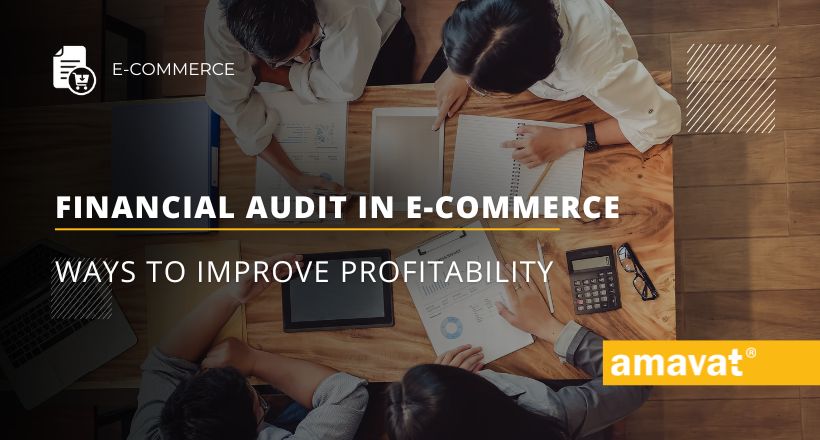Financial audit in e-commerce: Ways to improve profitability
In the era of digitalization, running an online store has become one of the most popular ways to do business. However, merely having an e-store does not guarantee financial success. The key to achieving profitability and long-term success is a thorough financial audit of e-commerce. This audit is not limited to analyzing accounting books but includes a comprehensive assessment of operational efficiency, profitability analysis of customers and services, and recommendations for improving financial performance.
Purpose and scope of the e-commerce financial audit
The main goal of a financial audit in e-commerce is to identify areas where business profitability can be increased. This means not only controlling costs and revenues but also analyzing various aspects of the online store’s operations, including marketing efficiency, logistics costs, sales channel efficiency, and customer management. This audit provides specific recommendations that can significantly improve financial results.
Main areas of e-commerce store profitability analysis
A financial audit in e-commerce should be conducted in several key areas:
- Profitability of sales channels:
- Profitability of customers in individual acquisition channels:
- Mixed model: Customer-service or service-customer channel:
This analysis helps understand which sales channels are most profitable. It may turn out that direct sales through your own online store are more costly than selling through auction platforms or marketplaces due to differences in operating costs associated with each channel.
This analysis identifies which customer acquisition channels are most effective. Examples of channels include search engines (organic), affiliate networks, external call centers, or emailing to external databases. This analysis allows for investing in the most profitable channels and optimizing or discontinuing less effective ones.
This type of analysis provides detailed information on the profitability of a specific customer or group of customers in relation to products and services and their acquisition channels. This helps better tailor marketing and operational strategies.
Key steps in the e-commerce financial audit
Conducting a financial audit of e-commerce can be divided into three main stages:
- Defining methods for measuring and assessing profitability:
- Conducting the audit:
- Recommendations for changes:
At this stage, specific indicators and analysis methods are defined to evaluate profitability. These can include various financial metrics such as gross margin, net margin, ROI (return on investment), and CAC (customer acquisition cost).
In this stage, financial and operational data of the online store are collected and analyzed. The analysis covers operating costs, marketing costs, advertising campaign effectiveness, logistics and warehousing costs, and internal process efficiency.
Based on the conducted analysis, the auditor prepares a report containing detailed recommendations for improving profitability. These recommendations may include cost optimization, changes in marketing strategy, improving operational efficiency, and implementing new technologies and tools.
Ways to increase profits in an online store
Achieving profitability in e-commerce requires both increasing revenues and reducing costs. Here are five proven ways to increase profits in an online store:
- Budgeting and financial analysis:
- Optimizing marketing activities:
- Negotiating with couriers and optimizing logistics:
- Automating warehouse processes:
- Negotiating online payment commissions:
The first step is to thoroughly understand the finances of the online store. Setting a budget and regularly analyzing costs and revenues allows for quick detection of areas where money can be saved or profits increased.
Analyzing the effectiveness of marketing campaigns is crucial for profitability. Regular monitoring and evaluation of marketing activities’ effectiveness allow for better utilization of the advertising budget and increasing the return on investment.
Logistics costs are among the highest operational costs in e-commerce. Negotiating rates with courier companies and analyzing and optimizing warehouse processes can significantly reduce these costs.
Automating warehouse processes such as order picking and packing can greatly increase operational efficiency. Implementing a warehouse management system (WMS) allows for better inventory management and quick order fulfillment.
Online payment commission costs can be significant. Negotiating better terms with online payment operators can bring significant savings.
E-commerce audit
A financial audit in e-commerce is an essential element that enables a detailed analysis and optimization of an online store’s finances. However, an e-commerce audit encompasses a much broader range of activities. Besides financial analysis, this audit also examines aspects such as user experience, logistics operations, marketing strategies, and technologies used in the store. This provides a comprehensive view of the e-store’s operations, allowing for the identification and improvement of weak points in various areas, leading to increased efficiency and profitability.
An e-commerce audit consists of the following elements:
- Proper audit:
- Technical audit:
- Process audit:
- Technical SEO audit:
- Online marketing audit:
- Legal audit:
Analysis of all website elements, such as the homepage, menu, product categories and subcategories, information sections, and how the offer is presented on different devices.
Verification of the site for technical issues that may affect its functionality. This includes analyzing UX (user experience), UI (user interface), and CX (customer experience) parameters.
Analysis of order flow and standards for handling complaints and returns processes. Verification of whether operational processes are efficient and compliant with best practices.
Checking if the website is properly optimized for SEO, which is crucial for positioning in organic search results.
Analysis of the effectiveness of marketing activities and analytical tools used to monitor site traffic and marketing campaign effectiveness.
Verification that the online store complies with all legal requirements, including data protection (GDPR), store regulations, and privacy policy.
Summary
Running an online store does not automatically guarantee financial success. The key to achieving profitability is a thorough financial audit of e-commerce, which includes analyzing operational efficiency, customer and service profitability, and providing specific recommendations for improving financial results. This audit examines key areas such as sales channel profitability, marketing activity effectiveness, and logistics cost optimization. This allows online stores to identify areas needing improvement, increase profits, and ensure long-term success.





